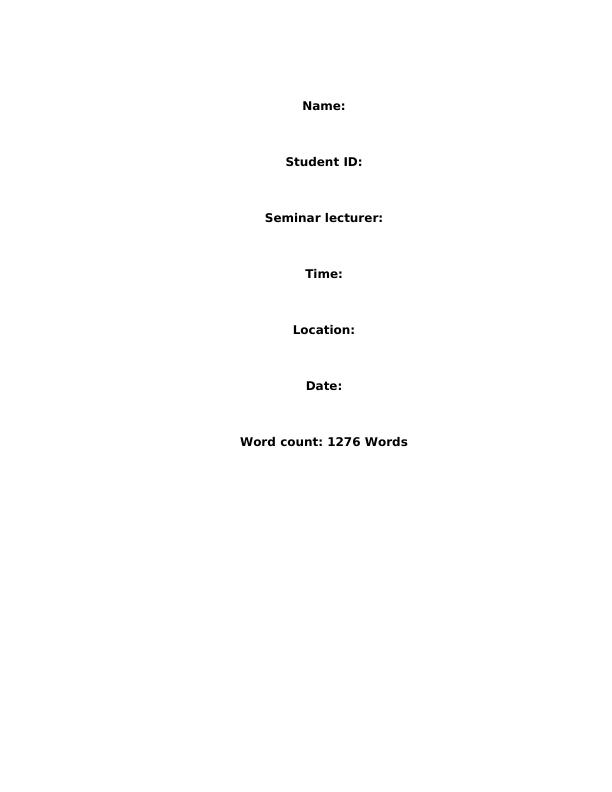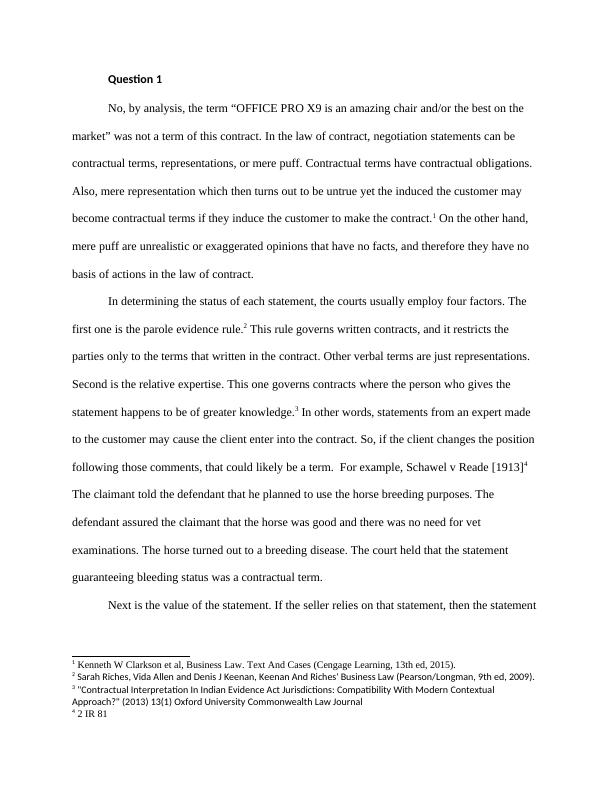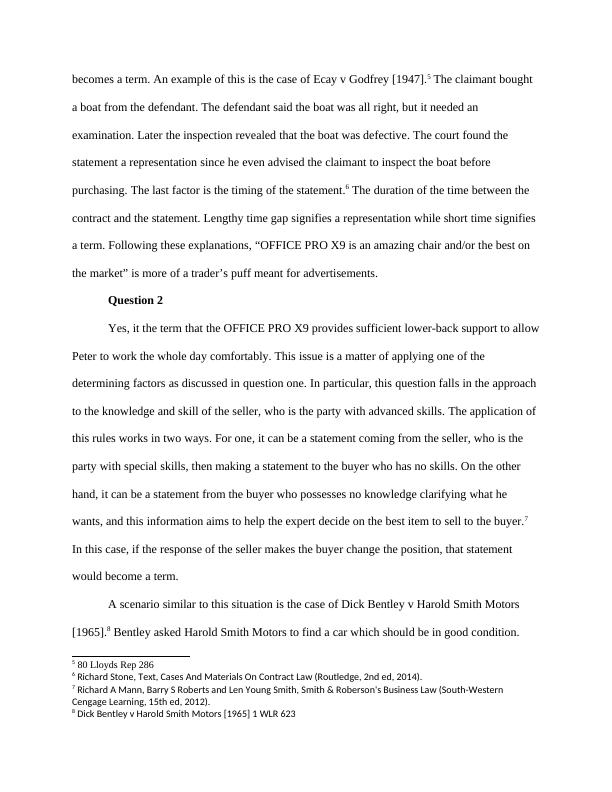Ask a question from expert
Business Law, Text and Cases- Assignment
7 Pages1734 Words243 Views
Added on 2019-11-26
Business Law, Text and Cases- Assignment
Added on 2019-11-26
BookmarkShareRelated Documents
Name:Student ID:Seminar lecturer:Time:Location:Date:Word count: 1276 Words

Question 1No, by analysis, the term “OFFICE PRO X9 is an amazing chair and/or the best on the market” was not a term of this contract. In the law of contract, negotiation statements can be contractual terms, representations, or mere puff. Contractual terms have contractual obligations. Also, mere representation which then turns out to be untrue yet the induced the customer may become contractual terms if they induce the customer to make the contract.1 On the other hand, mere puff are unrealistic or exaggerated opinions that have no facts, and therefore they have no basis of actions in the law of contract. In determining the status of each statement, the courts usually employ four factors. The first one is the parole evidence rule.2 This rule governs written contracts, and it restricts the parties only to the terms that written in the contract. Other verbal terms are just representations. Second is the relative expertise. This one governs contracts where the person who gives the statement happens to be of greater knowledge.3 In other words, statements from an expert made to the customer may cause the client enter into the contract. So, if the client changes the position following those comments, that could likely be a term. For example, Schawel v Reade [1913]4The claimant told the defendant that he planned to use the horse breeding purposes. The defendant assured the claimant that the horse was good and there was no need for vet examinations. The horse turned out to a breeding disease. The court held that the statement guaranteeing bleeding status was a contractual term.Next is the value of the statement. If the seller relies on that statement, then the statement 1 Kenneth W Clarkson et al, Business Law. Text And Cases (Cengage Learning, 13th ed, 2015).2 Sarah Riches, Vida Allen and Denis J Keenan, Keenan And Riches' Business Law (Pearson/Longman, 9th ed, 2009).3 "Contractual Interpretation In Indian Evidence Act Jurisdictions: Compatibility With Modern Contextual Approach?" (2013) 13(1) Oxford University Commonwealth Law Journal4 2 IR 81

becomes a term. An example of this is the case of Ecay v Godfrey [1947].5The claimant bought a boat from the defendant. The defendant said the boat was all right, but it needed an examination. Later the inspection revealed that the boat was defective. The court found the statement a representation since he even advised the claimant to inspect the boat before purchasing. The last factor is the timing of the statement.6 The duration of the time between the contract and the statement. Lengthy time gap signifies a representation while short time signifies a term. Following these explanations, “OFFICE PRO X9 is an amazing chair and/or the best on the market” is more of a trader’s puff meant for advertisements.Question 2Yes, it the term that the OFFICE PRO X9 provides sufficient lower-back support to allowPeter to work the whole day comfortably. This issue is a matter of applying one of the determining factors as discussed in question one. In particular, this question falls in the approach to the knowledge and skill of the seller, who is the party with advanced skills. The application of this rules works in two ways. For one, it can be a statement coming from the seller, who is the party with special skills, then making a statement to the buyer who has no skills. On the other hand, it can be a statement from the buyer who possesses no knowledge clarifying what he wants, and this information aims to help the expert decide on the best item to sell to the buyer.7In this case, if the response of the seller makes the buyer change the position, that statement would become a term. A scenario similar to this situation is the case of Dick Bentley v Harold Smith Motors [1965].8 Bentley asked Harold Smith Motors to find a car which should be in good condition. 5 80 Lloyds Rep 2866 Richard Stone, Text, Cases And Materials On Contract Law (Routledge, 2nd ed, 2014).7 Richard A Mann, Barry S Roberts and Len Young Smith, Smith & Roberson's Business Law (South-Western Cengage Learning, 15th ed, 2012).8 Dick Bentley v Harold Smith Motors [1965] 1 WLR 623

End of preview
Want to access all the pages? Upload your documents or become a member.
Related Documents
Negotiating with the best on the market: not all statements of negotiation are contractuallg...
|7
|1704
|442
Business Law Assignment - Contract Termslg...
|6
|1291
|136
Business Laws Questions Answerslg...
|7
|1560
|222
LST2BSL Introduction To Business Law And Ethicslg...
|9
|1662
|217
Business Laws Assignment | OFFICE PRO X9lg...
|8
|1749
|144
Introduction to Business Law and Ethicslg...
|8
|2006
|253